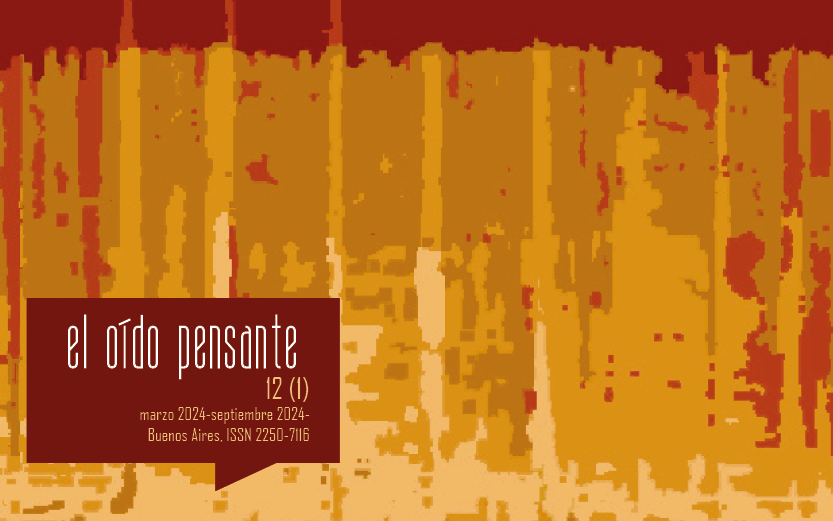The Poetics of Abstract Substantive Art
Abstract
The aim of this paper is to discuss the reasons why abstract substantive works of art achieve poetic meaning. Its ultimate purpose is to understand the poetic meaning of non-vocal instrumental music. In the first and second sections, I present certain philosophical assumptions about the substantive arts and about abstract art. Next, I recognize the non-neutral classificatory nature of my proposal (section 3). Then, I analyze certain examples of abstract works of art, especially musical works (sections 4 and 5). Finally, I conclude that, in order to achieve poetic meaning, works of abstract substantive art should be linked in an intelligible way to the reality outside them.Downloads
References
Alvargonzález, D. (2021a). The Idea of Substantive Arts. Aisthesis. Pratiche, linguaggi e saperi dell’estetio, 14(1), 135-151. doi: https://doi.org/10.36253/Aisthesis-11912.
Alvargonzález, D. (2021b). The Classification of Substantive Arts. Aisthesis. Pratiche, linguaggi e saperi dell’estetico 14(2), pp. 159-168. doi: https://doi.org/10.36253/Aisthesis-12470.
Biber, H.I.F. (1669). Sonata representativa en La mayor.
Bonds, M. E. (1991). Wordless Rhetoric. Musical Form and the Metaphor of the Oration. Cambridge, Massachusetts: Harvard University Press.
Bonds, M. E. (2006). Music as Thought. Princeton, New Jersey: Princeton University Press.
Brendel, A. (1998). Musical Thoughts and Afterthoughts. London: Robson Books.
Bueno, G. (2007). Religión y arte. En La fe del ateo (pp. 265-297). Barcelona: Temas de Hoy.
Carroll, L. (2011). Alicia a través del espejo. Madrid: Alianza Editorial.
Coll, J. (1991). Atila. Barcelona: Destino.
Dahlhaus, C. (1978). Die Idee der absoluten Musik. Kassel: Bärenreiter-Verlag.
Dubal, D. (2002). Evenings with Horowitz. A Personal Portrait. London: Robson Books.
Goehr, L. (1992). The Imaginary Museum of Musical Works. Oxford: Oxford University Press.
Gomila, A. (2010). Música y emoción: el problema de la expresión y la perspectiva de segunda persona. En J. Alcaraz, et al. (Eds.). Significado, emoción y calor. Ensayos sobre filosofía de la música (pp. 193-215). Madrid: Ediciones Machado.
Grey, Th. (2014). Absolute Music. En S. Downes (Ed.). Issues in the Aesthetics of Music: Musicological Perspectives (pp.42-61). London: Routledge.
Hanslick, E. (1986). On the Musically Beautiful. Indianapolis: Hackett Publishing Company.
Joyce, J. (2016). Finnegans Wake. Buenos Aires: El cuenco de Plata.
Kivy, P. (2002). Introduction to a Philosophy of Music. Oxford: Clarendon Press.
Kivy, P. (2007). Music, Language and Cognition. And Other Essays in the Aesthetics of Music. Oxford: Clarendon Press.
Marañón, G. (1947). Don Juan. Ensayos sobre el origen de su leyenda. Madrid: Espasa.
Meyer, L. B. (2001). La emoción y el significado en la música. Madrid: Alianza.
Mithen, S. (2005). The Singing Neanderthals. The Origins of Music, Language, Mind and Body. Londres: Widenfeld & Nicholson.
Pérez de Ayala, R. (1990). Tigre Juan. Madrid: Espasa.
Souriau, É. (1965). La correspondencia de las artes. Elementos de estética comparada. México: FCE.
Young, J. O. (2014). Critique to Pure Music. Oxford: Oxford University Press.
Wagner, R. (2009). Richard Wagner and his World. Princeton, New Jersey: Princeton University Press.























